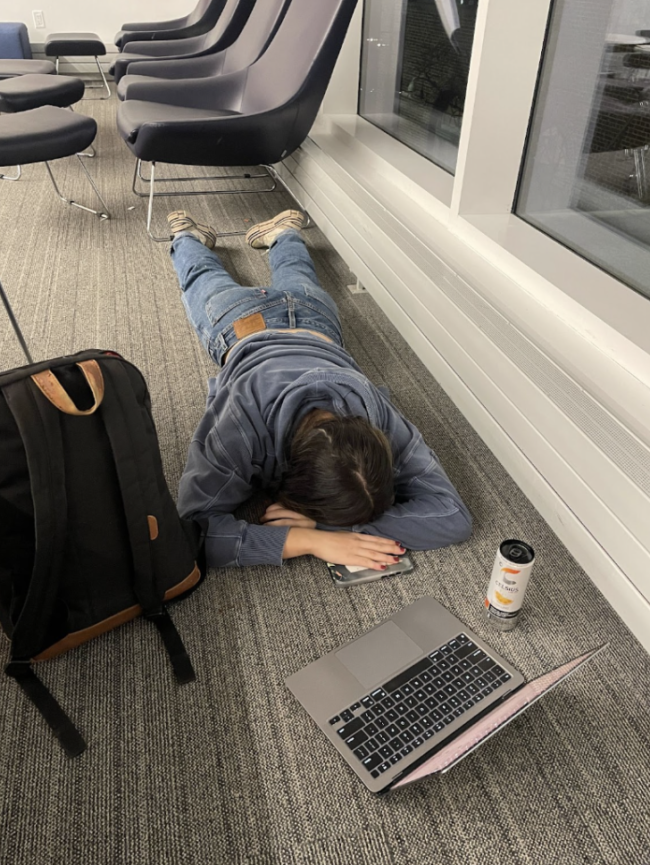60% of American students report feeling burnt out. Defined as a condition caused by chronic stress and a large workload, burnout is a state of emotional and physical exhaustion and Fieldston’s junior class has begun to feel the effects. Juniors can be seen arriving late to school, sleeping in assembly or crying in bathrooms all over campus. To illustrate and understand the junior classes’ experience, I interviewed a series of Form V students.
Shayna Sacks (Form V) explained, “Before junior year, I had heard a lot of older students warn me, ‘Junior year is a beast, buckle up.’ I soon came to understand that they were correct.” Since we were freshmen we have heard from upperclassmen that the worst is yet to come, and it seems that it has. Ruthie Behrendt (Form V) described her repetitive routine: “Every day I’m so exhausted and I’m stuck in a cycle where I have so much work where I’m not getting any sleep. It’s a cycle with no breaks, and even when I finish one stressful assignment there’s another one to do.”
Juniors have begun a relentless cycle of work, where we are in constant “to-do” mode, whether on the bus or at lunch. In the back of our minds, we are always thinking about the next thing on our to-do list. One student spoke about the stress of this cycle, “I often feel overwhelmed by the pressure of junior year, and sometimes that stress affects my academic performance. A declining academic performance then overwhelms me further, leading to an endless cycle where I’m just getting more and more stressed. The story of my junior year is just doing my absolute best to avoid that cycle.”
Many teachers, family members and underclassmen do not comprehend why this particular year is significantly worse. One junior explains: “I was burnt out by my freshman year spring. I’m just going through the motions at this point.” Another echoed “I burnt myself out last year and I don’t have it in me this year. The school doesn’t help us with the pressures that we’re facing. They make it worse.” Some students feel there is a lack of empathy from adults and administrators in understanding the student experience. Yet, administrators and teachers are constantly talking about stressors and workload. For many students, it’s not the workload that has burned them out but rather additional pressures. Ellie Usdin (Form V) said “The amount of work isn’t the crazy thing, it’s just what everyone expects of me. I’m so burnt out, but I know that I can’t burn out yet.” These statements led me to wonder, what causes this intense burnout?
One student shared, “The environment of intensive classes encourages students to compare themselves to others. I think that this comparison puts a lot of inherent academic pressure and it is very mentally draining.” Another student added, “The factors of my burnout are: I have so much homework, I don’t sleep, there’s so much pressure to do extracurriculars and there is so much test prep.” One student captured it pithily: “Too much to do, too little time.”
However, some juniors in City Semester spoke of their high levels of motivation. Caitlin Neidow (Form V) shared, “For me, doing City Sem has offered me a way of learning that is less mentally exhausting as it exercises different parts of my brain. We do a lot of hands-on learning which does not create burnout but rather metacognition. Since City Sem creates an environment where students feel excited to learn and can focus.”
For many students, the only way out of this never-ending cycle seems to be applying to a different school or a semester-away program. Cassidy Takeuchi (Form V) shared, “Every time my burnout gets too intense, I submit an application to a boarding school.”
For more nuanced advice, I asked Dr. Meghan Oppenheimer, the Form V psychologist, for her thoughts. “To help manage academic burnout, make a work plan for the day and week. Our bodies and minds can only sit and focus for so long, so be sure to also schedule planned breaks. Schedule time for activities you enjoy — spending time with friends and family, creating music or art, playing sports, exploring the city, cooking, watching a movie or whatever it may be. Do your best to sleep well, eat and hydrate well. These behaviors are fundamental to our well-being but are often the first to go when we begin to feel stressed. Ask for help. Meet with teachers and talk with parents and friends. Reach out to a psychologist or counselor to help you manage the stress or burnout you may be feeling.”
A feeling of isolation and despair pervades the burnout experience. I believe the only way to cope with our shared burnout is to discover community within this unique, and exhausting year. As students in a competitive and academically challenging environment, we often discuss our high test scores and stay silent about our low grades. A “culture of comparison” is created through a toxic cycle of only speaking about our successes. To break this cycle and speak out means to discuss our mental exhaustion, stress, and experiences without the stigma of feeling weak or less than others.
When you are sitting at your desk at 1:30 am, remember, that you are not alone.






